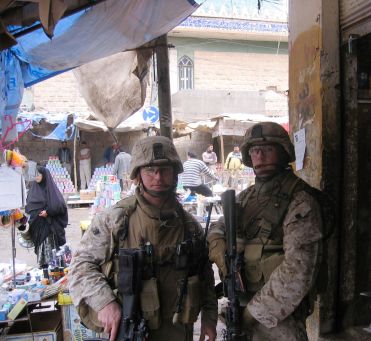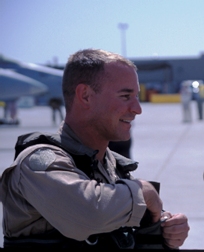In a recent New York Times Op-Ed, “Don’t Ask, Don’t Tell, Don’t change,” General McPeak suggests that repeal of the US military’s Don’t Ask Don’t Tell policy would be imprudent, especially during a time of war.
I will be the first to acknowledge that we are at war, and that everything we do should first aim to support the infantryman on the front lines. But General McPeak is wrong. Things have changed.
First – Being around gays and lesbians isn’t a big deal anymore. A person’s sexual orientation doesn’t determine their professional ability - so why should I care who they date when they are off duty?
Actually, I do care - from a leadership point of view. I care because I was taught from day one of officer training to take care of my Marines, and that I could only take care of them if I knew them. I was taught that I should know their parent’s names, their hometown…..even know their favorite color. But how can I know them if I am prohibited from asking certain questions? And how can I be fully aware of my unit’s capabilities if certain members of my unit are forbidden from keeping me fully informed?
General McPeak suggests that we are not asking gay service men and women to lie. But if our leadership is truly taking care of their troops, and thereby truly optimizing unit performance by asking these questions - their troops are lying to them. This is especially problematic in a culture that values integrity and honesty so deeply. It is problematic for the gays and lesbians who do the lying, and hypocritical of military leadership to emphasize the necessities of honesty, but then require an exception.
Second – There will be “adjustments” that come with the repeal of DADT, but the changes will be much less dramatic than he suggests. Concerns often include bathroom and shower arrangements, general living arrangements, and the impact of potential relationships within units. Many of these concerns garner nothing more than a dismissive chuckle from most of the Marines I served with. This is primarily because most of us know at least one gay or lesbian outside the service, and the rumors we heard about gays and lesbians in 8th grade were dispelled long ago.
The reality is that gays and lesbians will integrate into everyday military life easily; gays will be required to comply with the same professional standards by which we expect males and females to conduct themselves when serving together.
Will some gay servicemen make unwanted advances on other servicemen while on the job? Probably. But that happens today between straight servicemen and women. From what I’ve seen, sexual harassment is treated harshly within the military, and it won’t be tolerated from gays or lesbians either. More than likely, the vast majority of service men and women will conduct themselves professionally. The ones that don’t will be dealt with using already established procedures. Sexual harassment is sexual harassment; a professional is a professional.
Third – General
McPeak suggests
that unit
cohesion might
suffer if gays
are allowed to
serve openly,
which would lead
to a degradation
of a unit’s
combat
capability. I
must admit that
prior to serving
in combat I
might have
believed this
argument. It
seems plausible
that “men need
to be men” on
the field of
battle, and that
gay men serving
openly would
somehow betray
the sacred trust
that only those
who have seen
combat know. I
have served in
combat, and have
a different
perspective.
 |
I was a pilot for most of my career. Two of my three combat deployments were flying tours; one was a ground tour. My ground tour was spent in Ramadi, Iraq, in 2005/06 as a forward air controller with an infantry unit. During this tour I participated in more than 100 gun battles in which the enemy attacked us with coordinated IED’s, rocket propelled grenades, machine guns and mortars. I have no doubt that the boys that hit the beaches of Normandy and Iwo Jima saw worse than I did, but I also feel confident that I know combat well enough to offer an opinion. |
What I know convinces me that when people talk of unit cohesion in reference to DADT it is usually for bravado and effect – it is usually not based in reality. I’ll try to skip the bravado and simply give my point view:
 |
I formed what I thought was a close bond with my unit before we saw combat, but that bond – the one formed before combat - turned out to be almost completely irrelevant compared to the bond formed in combat. That’s because when the shooting started I didn’t care who had my back, I just cared that they did. If they were pointing their rifle in the right direction, and we were trying to kill the same enemy – that was all the “cohesion” I needed. This is not to say that I didn’t form bonds with the Marines I served with - I certainly did. But the bonds were not born out of an overdrawn machismo, or because we thought we should – but because we fought for our lives together. For me at least, General McPeak has confused the necessity of cohesion with the cause. |
This thought is akin to the idea that soldiers don’t care about politics when the shooting starts. For me that was certainly true. I consider myself invested in politics. I care about my country. When I was in Iraq I wanted above all things to return with honor. But when the shooting started, the politics predictably melted away - it was just us against them. If one of “us” happened to be gay – it just wouldn’t have mattered to me.
I care about civil rights, too, but I agree with the General that individual rights are secondary to unit effectiveness, and to the mission. My argument is not that we should repeal DADT for the sake of taking care of individuals for their own sake, but because leaders would actually be better off with the boundaries removed, and because times have changed. I don’t doubt that there was a time when gays serving openly would have degraded unit cohesion and performance more than was worth the benefit. That time has passed. Young service men and women don’t judge gays and lesbians the way our parents do. They are not only ready to have gays and lesbians serve openly – they think it’s a little silly that the previous generation is still in such a heated debate about whether or not they should.
Editors note: The author
is a graduate student in
the Columbia
University
School of
International
and Public
Affairs.
Former
Major Rudy Rickner
was a Marine
F/A-18 Pilot. He
completed over
150 combat
missions in Iraq
between 2003 and
2007 and was
awarded the
Bronze Star with
“V” for heroism
while serving
with the
infantry as a
forward air
controller in Ramadi, Iraq, in
2006.
